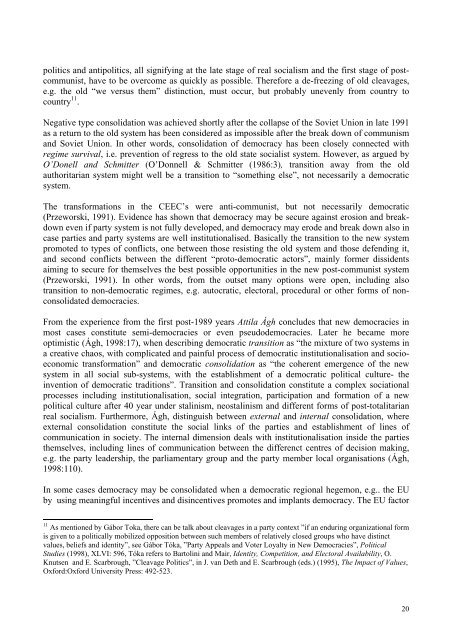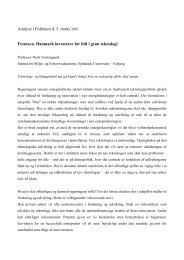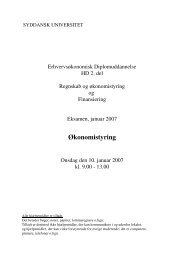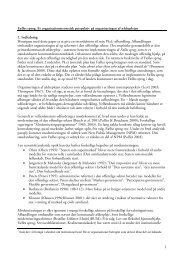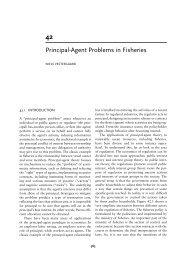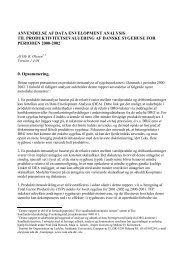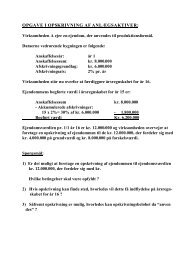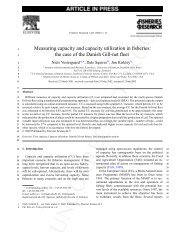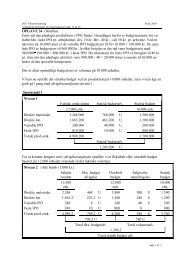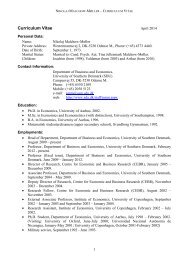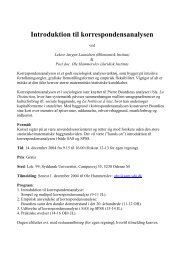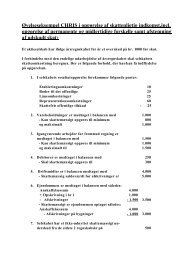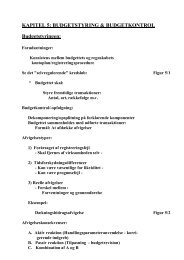politics <strong>and</strong> antipolitics, all signify<strong>in</strong>g at the late stage <strong>of</strong> real socialism <strong>and</strong> the first stage <strong>of</strong> postcommunist,have to be overcome as quickly as possible. Therefore a de-freez<strong>in</strong>g <strong>of</strong> old cleavages,e.g. the old “we versus them” dist<strong>in</strong>ction, must occur, but probably unevenly from country tocountry 11 .Negative type consolidation was achieved shortly after the collapse <strong>of</strong> the Soviet Union <strong>in</strong> late 1991as a return to the old system has been considered as impossible after the break down <strong>of</strong> communism<strong>and</strong> Soviet Union. In other words, consolidation <strong>of</strong> democracy has been closely connected withregime survival, i.e. prevention <strong>of</strong> regress to the old state socialist system. However, as argued byO’Donell <strong>and</strong> Schmitter (O’Donnell & Schmitter (1986:3), transition away from the oldauthoritarian system might well be a transition to “someth<strong>in</strong>g else”, not necessarily a democraticsystem.The transformations <strong>in</strong> the CEEC’s were anti-communist, but not necessarily democratic(Przeworski, 1991). Evidence has shown that democracy may be secure aga<strong>in</strong>st erosion <strong>and</strong> breakdowneven if party system is not fully developed, <strong>and</strong> democracy may erode <strong>and</strong> break down also <strong>in</strong>case parties <strong>and</strong> party systems are well <strong>in</strong>stitutionalised. Basically the transition to the new systempromoted to types <strong>of</strong> conflicts, one between those resist<strong>in</strong>g the old system <strong>and</strong> those defend<strong>in</strong>g it,<strong>and</strong> second conflicts between the different “proto-democratic actors”, ma<strong>in</strong>ly former dissidentsaim<strong>in</strong>g to secure for themselves the best possible opportunities <strong>in</strong> the new post-communist system(Przeworski, 1991). In other words, from the outset many options were open, <strong>in</strong>clud<strong>in</strong>g alsotransition to non-democratic regimes, e.g. autocratic, electoral, procedural or other forms <strong>of</strong> nonconsolidateddemocracies.From the experience from the first post-1989 years Attila Ágh concludes that new democracies <strong>in</strong>most cases constitute semi-democracies or even pseudodemocracies. Later he became moreoptimistic (Ágh, 1998:17), when describ<strong>in</strong>g democratic transition as “the mixture <strong>of</strong> two systems <strong>in</strong>a creative chaos, with complicated <strong>and</strong> pa<strong>in</strong>ful process <strong>of</strong> democratic <strong>in</strong>stitutionalisation <strong>and</strong> socioeconomictransformation” <strong>and</strong> democratic consolidation as “the coherent emergence <strong>of</strong> the newsystem <strong>in</strong> all social sub-systems, with the establishment <strong>of</strong> a democratic political culture- the<strong>in</strong>vention <strong>of</strong> democratic traditions”. Transition <strong>and</strong> consolidation constitute a complex sociationalprocesses <strong>in</strong>clud<strong>in</strong>g <strong>in</strong>stitutionalisation, social <strong>in</strong>tegration, participation <strong>and</strong> formation <strong>of</strong> a newpolitical culture after 40 year under stal<strong>in</strong>ism, neostal<strong>in</strong>ism <strong>and</strong> different forms <strong>of</strong> post-totalitarianreal socialism. Furthermore, Ágh, dist<strong>in</strong>guish between external <strong>and</strong> <strong>in</strong>ternal consolidation, whereexternal consolidation constitute the social l<strong>in</strong>ks <strong>of</strong> the parties <strong>and</strong> establishment <strong>of</strong> l<strong>in</strong>es <strong>of</strong>communication <strong>in</strong> society. The <strong>in</strong>ternal dimension deals with <strong>in</strong>stitutionalisation <strong>in</strong>side the partiesthemselves, <strong>in</strong>clud<strong>in</strong>g l<strong>in</strong>es <strong>of</strong> communication between the differenct centres <strong>of</strong> decision mak<strong>in</strong>g,e.g. the party leadership, the parliamentary group <strong>and</strong> the party member local organisations (Ágh,1998:110).In some cases democracy may be consolidated when a democratic regional hegemon, e.g.. the EUby us<strong>in</strong>g mean<strong>in</strong>gful <strong>in</strong>centives <strong>and</strong> dis<strong>in</strong>centives promotes <strong>and</strong> implants democracy. The EU factor11 As mentioned by Gábor Toka, there can be talk about cleavages <strong>in</strong> a party context ”if an endur<strong>in</strong>g organizational formis given to a politically mobilized opposition between such members <strong>of</strong> relatively closed groups who have dist<strong>in</strong>ctvalues, beliefs <strong>and</strong> identity”, see Gábor Tóka, ”<strong>Party</strong> Appeals <strong>and</strong> Voter Loyalty <strong>in</strong> New Democracies”, PoliticalStudies (1998), XLVI: 596, Tóka refers to Bartol<strong>in</strong>i <strong>and</strong> Mair, Identity, Competition, <strong>and</strong> Electoral Availability, O.Knutsen <strong>and</strong> E. Scarbrough, ”Cleavage Politics”, <strong>in</strong> J. van Deth <strong>and</strong> E. Scarbrough (eds.) (1995), The Impact <strong>of</strong> Values,Oxford:Oxford University Press: 492-523.20
played an important role e.g. <strong>in</strong> the case <strong>of</strong> Spa<strong>in</strong>’s <strong>and</strong> Portugal’s transition to democracy, <strong>and</strong> thiseexperiences have played a certa<strong>in</strong> role also <strong>in</strong> the case <strong>of</strong> craft<strong>in</strong>g democracy <strong>in</strong> the CEEC’s.However, some differences between the South European <strong>and</strong> the East European ways <strong>of</strong>consolidation have been strik<strong>in</strong>g. For example the economic consolidation <strong>and</strong> market economy <strong>in</strong>Spa<strong>in</strong> <strong>and</strong> Portugal was more advanced at the time for democratic break through <strong>and</strong> the subsequentconsolidation. Therefore the way down <strong>in</strong> the “valley <strong>of</strong> tears” was more short term <strong>and</strong> less pa<strong>in</strong>fulthan <strong>in</strong> the CEEC’s.Nonetheless, <strong>in</strong> the end democracy became “the only game <strong>in</strong> town” <strong>in</strong> most CEECs. The “two-turnover test” has been passed, as presidential power as well as governmental power have peacefullytranferered to the opposition <strong>in</strong> case <strong>of</strong> election defeat for the parties <strong>in</strong> power. However, withoutgreater civic participation <strong>and</strong> further <strong>in</strong>stitutionalisation the transition to more advanced democracywill not take place <strong>and</strong> “democratic government” will not constitute a “democratic regime 12 . Also“authoritarian situations” are well known <strong>in</strong> the CEEC’s, e.g. <strong>in</strong> Hungary under Viktor Orban, <strong>in</strong>which case the dom<strong>in</strong>ant political agents exclude other agents from the political process therebysecur<strong>in</strong>g for themselves direct or <strong>in</strong>direct control over the political life <strong>in</strong>clud<strong>in</strong>g mass media 13 . Insuch casesthe democratic <strong>in</strong>stitutions are <strong>in</strong> place, but democratic rules are “hollowed out” due tothe w<strong>in</strong>ner parties’ strong focus on keep<strong>in</strong>g political power accord<strong>in</strong>g to the classical pr<strong>in</strong>cipleabout the w<strong>in</strong>ners, “that takes it all”. In other words, consolidation <strong>of</strong> democracy dem<strong>and</strong>s aconsiderable “self-limitation” on behalf <strong>of</strong> the parties <strong>in</strong> governments as well the parties theopposition.To conclude, concern<strong>in</strong>g consolidation <strong>of</strong> democracy <strong>in</strong> the CEEC’s we still can use ZoltanBarany’s formulation:“What we currently have <strong>in</strong> Eastern Europe are imperfect, <strong>and</strong> <strong>in</strong> some places (e.g. Albania,Romania, Slovakia) fragile but, most importantly, function<strong>in</strong>g, work<strong>in</strong>g, democratic polities”(Braun <strong>and</strong> Barany, 1999:107).1.6. The left-right divide <strong>and</strong> post-communist cleavagesMany notions have been used when characteriz<strong>in</strong>g political parties. In the operat<strong>in</strong>g style, mostparties shared the competitive logic <strong>of</strong> western catch-all parties, but lacked their ideological <strong>and</strong>organisational anchors. The left-right divide known from already established political party systemscannot be used. However, <strong>in</strong>stead <strong>of</strong> disappear<strong>in</strong>g, the left <strong>and</strong> right divide exist <strong>in</strong> peoples m<strong>in</strong>d,but differently <strong>in</strong> each East Central European country. The different patterns <strong>of</strong> ideologicalstructur<strong>in</strong>g shall be seen <strong>in</strong> the context <strong>of</strong> the ma<strong>in</strong> cleavages <strong>and</strong> each country's experiences at thetime <strong>of</strong> leav<strong>in</strong>g socialism 14 . Thus the party systems emerg<strong>in</strong>g <strong>in</strong> the Czech Republic after 1989,already <strong>in</strong> the first stages came close to the left-right division <strong>in</strong> the more classic sense, accord<strong>in</strong>g to12 Wlodzimierz Weselowski dist<strong>in</strong>guishes referr<strong>in</strong>g to O´Donnald (1994) between “democratic government” <strong>and</strong>“democratic regime” <strong>in</strong> “Political Actors <strong>and</strong> Democracy: Pol<strong>and</strong> 1990-1997”, Polish Sociological Review, 3 (119),Warsaw, 1997:227.13 A term used e.g. by Juan L<strong>in</strong>z, “The Future <strong>of</strong> the Authoritarian Situation or Institutionalization <strong>of</strong> an AuthoritarianRegime: The Case <strong>of</strong> Brazil”, <strong>in</strong> Alfred Stepan (ed.) (1973), Authoritarian Brazil. Orig<strong>in</strong>s, Policies <strong>and</strong> Future, NewHaven, CT, <strong>and</strong> London, Yale University Press:233-254.14 Attila Ágh, ”<strong>Party</strong> Formation Process <strong>and</strong> the 1998 Elections <strong>in</strong> Hungary”, East European Politics <strong>and</strong> Societies, Vol.14, No.2, Spr<strong>in</strong>g 2000:292, <strong>and</strong> Radoslaw Markowski, ”Political <strong>Parties</strong> <strong>and</strong> Ideological Spaces <strong>in</strong> East CentralEurope”, Communist <strong>and</strong> Post-Communist Studies 30:3 (1997):122.21
- Page 3: “This provisional situation chara
- Page 6 and 7: marketisation and privatisationshor
- Page 8 and 9: purposes, are channels for “expre
- Page 10 and 11: the significance of strategic choic
- Page 12 and 13: presidentialism gave rise to “flo
- Page 14 and 15: antipolitics and reinforcement of a
- Page 16 and 17: In the late 1990’s elections most
- Page 18 and 19: determined primarily by “politica
- Page 22 and 23: which attitudes to state regulation
- Page 24 and 25: Anti-communism has been defined in
- Page 26 and 27: elections and the Slovak communists
- Page 28 and 29: Cartel agreementsbetter representat
- Page 30 and 31: Basically the absence of clear cons
- Page 32 and 33: After 1989 different types of polit
- Page 34 and 35: complex project for transition unde
- Page 36 and 37: window of opportunity in spite of s
- Page 38 and 39: analyses of party institutionalizat
- Page 40 and 41: political messages and slogans. Thu
- Page 42 and 43: well established party culture may
- Page 44 and 45: expected, much due to the many spli
- Page 46 and 47: Furthermore, the polarisation on el
- Page 48 and 49: Finally, Solidarity can also be con
- Page 50 and 51: whole, on the one side an authorita
- Page 52 and 53: The economic recession and the grav
- Page 54 and 55: election defeat more cooperation an
- Page 56 and 57: The formation of AWS can be conside
- Page 58 and 59: group. RS AWS constituted the Chris
- Page 60 and 61: According to the original plans the
- Page 62 and 63: values. According to Rybicki, as so
- Page 64 and 65: AWS should fight against all types
- Page 66 and 67: 2001 parliamentary election, howeve
- Page 68 and 69: and workers voted ZChN. At the 1993
- Page 70 and 71:
The League has been considered as a
- Page 72 and 73:
establishment like than LPR’s. Th
- Page 74 and 75:
jobs in rural areas, especially sma
- Page 76 and 77:
industrial policy. According to the
- Page 78 and 79:
pressurizing the government to give
- Page 80 and 81:
democrats, thereby locating itself
- Page 82 and 83:
To conclude, the Freedom Union (UW)
- Page 84 and 85:
Polish middle class. Thus, in Janua
- Page 86 and 87:
such as KSCM and KSS in The Czech R
- Page 88 and 89:
The SLD leaders were mainly recruit
- Page 90 and 91:
the falling popular support for pri
- Page 92 and 93:
innovation was formation of the pol
- Page 94 and 95:
place after talks with each applica
- Page 96 and 97:
Has the Left any freedom of manoeuv
- Page 98 and 99:
medicine, changes in the labour cod
- Page 100 and 101:
The Labour Union (UP), Democratic U
- Page 102:
Nevertheless, before that had taken


